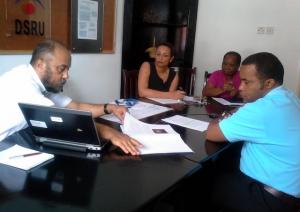Seychelles develops ‘Strategic plan for Measles Elimination 2015-2020’
Measles is a highly infectious viral disease caused by a Morbillivirus. It only affects humans and rapidly spreads among individuals who have not been vaccinated. It is also the leading cause of vaccine-preventable deaths among children worldwide.
Based on WHO strategic plan 2012-2020, 1-5% of children with measles die from complications of the disease each year. An estimated figure of 139, 300 people died from measles in 2010 worldwide and they are mostly children under the age of five years old. Rubella on the other hand is an acute, usually mild viral disease traditionally affecting susceptible children and young adults worldwide. Apart from the congenital infection, rubella is a mild self-limited illness that usually occurs during childhood.
In Seychelles measles vaccine was introduced in 1967 and in 1989, Measles, mumps and rubella vaccine (MMR) was introduced to all children at fifteen months age. Since 2001, Seychelles has introduced a second dose of MMR to children at 6 years of age.
In April 2012, the measles and rubella Initiative launched a Strategic Plan 2012-2020, containing ambitious goals. Together with other partners in the Measles & Rubella Initiative WHO/UNICEF provides technical and financial support to governments to establish effective disease surveillance systems. Seychelles benefited from such support in 2015 to establish a comprehensive surveillance system by joining other countries into the measles eradication campaign.
With the technical support from WHO, the country has developed its ‘Strategic plan for Measles Elimination in Seychelles 2015-2020’ . As part of the process, training was one of the activities conducted to address the above strategy. Clinicians, Nurse managers and nurses were trained during a number of sessions which took place from 8th to 12th June for lab technicians and 27th to 30th October 2015 for Clinicians , nurses and nurse managers. Participants from Public health laboratory also followed a one week capacity building. The aim of the trainings for the various participants were as follow:
To build the laboratory capacity to support the measles/rubella surveillance and to strengthen coordination between the lab networks and to initiate measles/rubella serological testing on elimination standard measles, rubella fever rash surveillance.
To update participants on current epidemiology of polio, AFP surveillance performance standards, the SOPs of polio outbreak response, the Polio Endgame strategies, Phase 1 containment; the polio risk assessment tool, update on supplementary AFP surveillance
To update participants on the measles and rubella surveillance standard performance, data management of case based measles/rubella surveillance, outbreak investigation principles for measles and rubella. World Health Organization protocol on establishment of method of disease burden document of CRS, the changes in database for elimination mode measles surveillance, risk management monitoring tool for measles outbreaks.
Lessons and outcomes
The capacity building exercise went very well. The participants expressed their appreciation and said that the training was a refresher for them especially the IDSR part. They felt that they are now better prepared and know exactly what to do if ever an AFP case or a measles outbreak is suspected in the country. Overall, based on the result from the pre and post tests administered during all trainings, result shows that learning has taken place and there were great improvement from the post test.
The Way Forward
In the meantime WHO continues to support the Laboratory staff with proficiency testing practice. This which will be used as a guide to check the level of proficiency the lab is at and to identify when they are ready to handle routine measles and rubella samples. The measles surveillance is expected to take place soon after the laboratory staffs have completed the training and passed the proficiency tests later in the year
__________________________________________________
For more information, please contact:
Doreen Hotive (Mrs), NPO/HIP Officer, Tel: (248) 4224795, Fax: (248) 225754, Email: hotived [at] who.int (hotived[at]who[dot]int)



